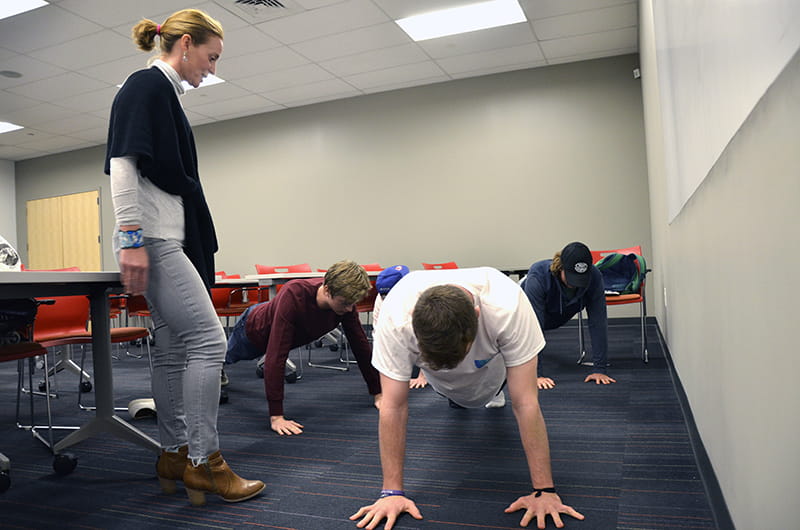Mindfulness and Well Being Class Teaches Mandatory Life Lessons on Happiness


Kasey Manwaring, owner of GoalsFit, a personal training studio in Manayunk, does a pre- and post-class workout with the ENTP 225 students.
This piece is part of the DrexelNow series showcasing "A Day in the Class" for some of Drexel University's most interesting and impactful courses.
As Barrie Litzky, PhD, an associate professor at Drexel University’s Charles D. Close School of Entrepreneurship, sets up for class this Tuesday morning, students ask her how her weekend was.
They’re mindful and cognizant of her wellbeing, as she is of theirs. In fact, she starts the same class asking the room full of second-year entrepreneurship and innovation students how applying for their first co-op is going.
“Rough.”
“Stagnant.”
“Lackluster.”
Each of these responses, intermixed with others, emit from the stressed group of students who have to prep their résumés and apply for co-ops by midnight the following evening. As a class, they discuss upcoming résumé workshops and help offered by their Steinbright Career Development Center co-op advisors to ease the strain of this first-time endeavor.
“So, you’ve got support. What kind of support is that?” Litzky asks, and all of a sudden, the group wellness discussion has just transitioned into the lesson. Litzky explains that the answer is tangible support, a type of social support studied in psychology.
For a class titled “Mindfulness and Well Being,” all of this isn’t necessarily an unexpected way to start the day.
But as ENTP 225 is also a new class this term, currently required for all second-year entrepreneurship students but also open to Drexel students from all years and majors, things are subject to change. Future classes may start out with a guided meditation, or a short classroom workout led by an entrepreneurial fitness coach and well-being practitioner.
The latter of which Litzky doesn’t consider herself to be, but Close School Dean Donna De Carolis, PhD, came to Litzky with the idea for the class given her background in both corporate training and organizational science and psychology. To close that gap, Litzky made a large part of the class focused around guest speakers who were also entrepreneurs in wellness fields, from yoga instructors to meditation and corporate wellness experts.
Although higher-ed courses like this are on the rise both in offering and popularity — take for instance Yale University’s “Psychology and the Good Life” course that broke registration records for the 317-year-old school — Litzky said it’s rare that such courses are required as part of a curriculum. But these lessons are important for both entrepreneurs and college students alike to learn early, and carry with them throughout their careers.
“People have to be able to learn how to become their best selves in order to not only perform but thrive,” Litzky said. “Entrepreneurs have to be able to pick themselves up after they fail, which they do time and again. They need to take initiative and be comfortable taking risks. Individuals with entrepreneurial mindsets tend to see problems as opportunities rather than as giant hurdles.
“Mindfulness and well-being are starting to become more important in the field of entrepreneurship,” she continued, “but it’s also more important to introduce them now because cultivating positive habits of mind takes practice. The complexity of life with today’s challenges causes a tremendous amount of stress for all students. Technology and the constant and easy access to everything creates a tremendously stressful environment for college students; much more so than when I was a college student.”
“Mindfulness and well-being are starting to become more important in the field of entrepreneurship,” she continued, “but it’s also more important to introduce them now because cultivating positive habits of mind takes practice. The complexity of life with today’s challenges causes a tremendous amount of stress for all students. Technology and the constant and easy access to everything creates a tremendously stressful environment for college students; much more so than when I was a college student.”
“There are a lot of [students] who are sad in general,” Plotkin said. “Most colleges and most classes teach you the facts and formulas and they rarely put you in the seat of the class. In this class, you are the class. They teach you the science of being happy, how to be more mindful and how to take care of yourself. They’re really teaching you how to do it and why it’s beneficial.”
Ever since the start of the term, Plotkin has noticed how the lessons taught by Litzky and class guests have been impacting his life: he’s more aware of his thoughts and surroundings, he’s adopted new habits and he’s more engaged with what’s taking place in the moment. He’s also enjoyed the openness of the class — created through Litzky’s transparency about her own personal and profession struggles, as well as through students sharing these themselves.
“It’s kind of like therapy in the class setting,” Plotkin said.
Litzky says she opens up to her students to show them that there’s always going to be an end to the difficult points of life, and that they can go “as deep as they want” when sharing with the class, but it is by no means required. And from the very first week of the term, this group of students weren’t shy in sharing their feelings about the No. 1 stress of the moment: finding a co-op. This is why Litzky plans to build in more class time moving forward to bring in Steinbright experts and bolster group discussions.
“If we’re talking about mindfulness and wellbeing, what they need right now, today, is to manage that stress of their first co-op,” she said. “Being in the present, and savoring every moment — that’s really what mindfulness is all about. It’s hard to do, but it’s really helpful for so many reasons.”
This lesson of living in the moment is exactly what Plotkin hopes the class can impart on all Drexel students.
This lesson of living in the moment is exactly what Plotkin hopes the class can impart on all Drexel students.
For Litzky, she hopes the fundamentals of positive psychology and building on strengths versus treating weaknesses can help students handle all of the hurdles life throws at them, whether that be now or in their future careers.
“These people are future leaders, so if they’re able to encompass these sorts of practices into their own ways of thinking, then they’re going to be better employees, better team leaders, role models, parents, whatever,” she said. “Whatever challenges they pursue, they have a strong sense of self and an ability to pick themselves up if they fail, to see the world, even the hard things, as beneficial to their personal growth. Then, they’re going to make the most out of whatever happens.”
Drexel News is produced by
University Marketing and Communications.
